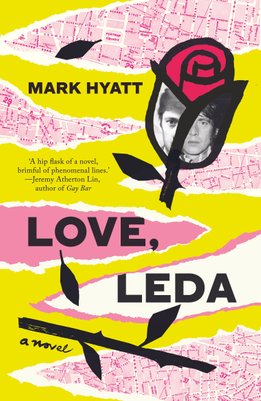Predating the decriminalisation of gay sex in 1967 and never before published, Love, Leda by Mark Hyatt is a lost gem of urban gay literature. By turns, audacious and affecting, Hyatt’s semi-autobiographical novel gives us a handful of days in the company of Leda, depressed narcissist and self-proclaimed ‘social bum’. Leda spends his days (and heady nights) searching for something beyond the greyness of an early 1960’s London that has yet to become groovy. A captivating read, it brilliantly chronicles an unapologetic adventurer and a bygone London.
‘It’s terrible to be young, always randy; one needs material.’
And one finds it in Leda’s world of sexual trysts. The novel opens in Dean Street, where he picks up a melancholic man with heavenly blue eyes. Usually a frequenter of the hip coffee bar scene of that era, here Leda takes him to a Lyon’s Corner House and propositions him over a cup of appropriately bittersweet coffee. Unspoken between them is the knowledge that their subsequent liaison will not be repeated. Leda’s sexual encounters tend to be triggered by a wink in a bar, a not-so-casual glance in a public lavatory. Getting beaten up is the occasional price to pay, but Leda endures.
‘Because I am homosexual, people with poverty of mind acknowledge my choice as a crime.’
In his pursuit of the bohemian, Leda leads a nocturnal life of smoky bars, jazz clubs, and the odd dalliance with a woman. Although declaring himself open to experience, this doesn’t appear to include the experience of work. While money plays a major role in the novel (Leda is forever sponging off his friends), the idea of the 9 to 5 grind horrifies him. Jobs in a factory and cafeteria are short lived, chiefly because ‘the fact of the job kills what is provisionally me.’
He is sickened by what a man has to do in order to survive and in the grip of an existential crisis. Conscious that he’s probably experienced more in life than his own (estranged) father has, and more, ‘it’s no wonder I get bored with life from time to time.’ Considering himself both free and lost, Leda is unravelling. A friend suggests it’s because he’s guilty about his way of life and ‘that’s the trouble.’
The trouble may also be that he’s suffering from a bout of unrequited love. The man in question is married with a child, the very model of conformity that Leda professes to disdain.
‘I want so much to be his wife and child. Poor me..’
In this gloriously evocative novel, London provides the backdrop to Leda’s moods. He strolls down Old Brompton Road, loving how deliciously dressed the ‘gay ones,’ are, sits outside the Tate Gallery dreamily watching the lights on the Thames. In a moment of despair, he stands ‘in loneliness,’ in Hyde Park, throwing his loose change into the Serpentine, teetering on the edge of self-destruction.
A note on the author shows us the parallels between Hyatt and his creation, Leda. Growing up in post-war London, Hyatt was a chaotic and bohemian spirit. He took his own life in 1972, leaving us with this wistful, unforgettable tale.
Love, Leda by Mark Hyatt is published by Peninsula Press, 176 pages.





